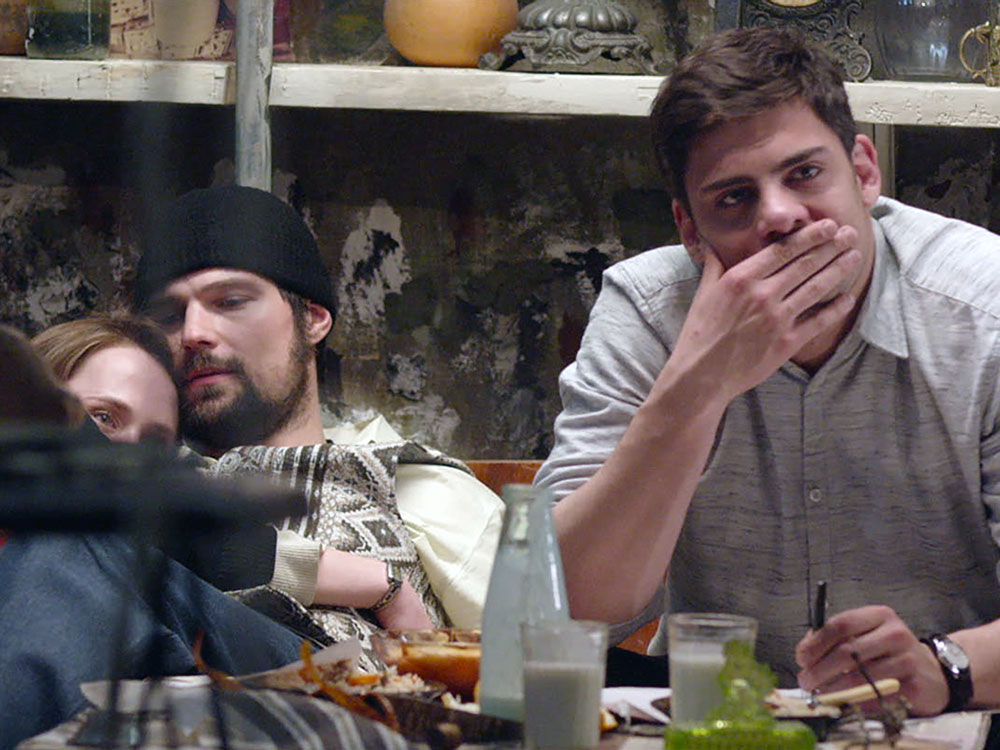The Asthenic Syndrome, dir. Kira Muratova, USSR (Ukraine) 1989
This double-bill brings together works by two Ukrainian-born filmmakers with a keen interest in dreams and temporality.
Written in 1989 just before the dissolution of the Soviet Union, The Asthenic Syndrome is Kira Muratova’s most celebrated film and won the Silver Bear when it premiered at the 1990 Berlinale. Often referred to as a portrait of an era, the film is made up of two stylistically and thematically distinct parts that tell the story of two archetypal Soviet intellectuals: Nikolai, the teacher who falls asleep in inappropriate places at the most inappropriate times, and Natalia, a doctor and distraught widow who has just buried her husband. “Muratova created vivid images of desperate characters determined to endure, capturing and divining the state of the USSR on the eve of its collapse. A searing portrait of individual malaise and collective apathy, with polyphonic elements and absurdist tableaus, the film stuns the viewer with shock therapy, destroying every illusion.” (Elena Gorfinkel)
Made two years after her pathbreaking work Meshes of the Afternoon (1943), Maya Deren’s Ritual in Transfigured Time (1945–46) brings together the interests in psychodrama, dream logic, and dance for which the filmmaker is renowned. Deren wrote, “I believe that Ritual contains everything that Meshes had, but has more, and, of course, differently,” and deemed it to be more representative of her practice than her most famous film.
A specially commissioned essay by Hannah Bonner accompanies this screening.
Programme:
Ritual in Transfigured Time, dir. Maya Deren, USA 1945-46, 16mm, 14 min., silent
The Asthenic Syndrome, dir. Kira Muratova, USSR (Ukraine) 1989, DCP, 153 min, Russian, Ukrainian, English and Romany spoken with English subtitles
Written in 1989 just before the dissolution of the Soviet Union, The Asthenic Syndrome is Kira Muratova’s most celebrated film and won the Silver Bear when it premiered at the 1990 Berlinale. Often referred to as a portrait of an era, the film is made up of two stylistically and thematically distinct parts that tell the story of two archetypal Soviet intellectuals: Nikolai, the teacher who falls asleep in inappropriate places at the most inappropriate times, and Natalia, a doctor and distraught widow who has just buried her husband. “Muratova created vivid images of desperate characters determined to endure, capturing and divining the state of the USSR on the eve of its collapse. A searing portrait of individual malaise and collective apathy, with polyphonic elements and absurdist tableaus, the film stuns the viewer with shock therapy, destroying every illusion.” (Elena Gorfinkel)
Made two years after her pathbreaking work Meshes of the Afternoon (1943), Maya Deren’s Ritual in Transfigured Time (1945–46) brings together the interests in psychodrama, dream logic, and dance for which the filmmaker is renowned. Deren wrote, “I believe that Ritual contains everything that Meshes had, but has more, and, of course, differently,” and deemed it to be more representative of her practice than her most famous film.
A specially commissioned essay by Hannah Bonner accompanies this screening.
Programme:
Ritual in Transfigured Time, dir. Maya Deren, USA 1945-46, 16mm, 14 min., silent
The Asthenic Syndrome, dir. Kira Muratova, USSR (Ukraine) 1989, DCP, 153 min, Russian, Ukrainian, English and Romany spoken with English subtitles
The Machine That Kills Bad People is, of course, the cinema – a medium that is so often and so visibly in service of a crushing status quo but which, in the right hands, is a fatal instrument of beauty, contestation, wonder, politics, poetry, new visions, testimonies, histories, dreams. It is also a film club devoted to showing work – ‘mainstream’ and experimental, known and unknown, historical and contemporary – that takes up this task. The group borrowed their name from the Roberto Rossellini film of the same title, and find inspiration in the eclectic juxtapositions of Amos Vogel’s groundbreaking New York film society Cinema 16.
The Machine That Kills Bad People is held bi-monthly in the ICA Cinema and is programmed by Erika Balsom, Beatrice Gibson, Maria Palacios Cruz, and Ben Rivers.
The Machine That Kills Bad People is held bi-monthly in the ICA Cinema and is programmed by Erika Balsom, Beatrice Gibson, Maria Palacios Cruz, and Ben Rivers.
06:30 pm
Tue, 22 Jul 2025
Cinema 1
Ticket information
- All tickets that do not require ID (full price, disabled, income support) can be printed at home or stored in email
- For aged-based concession tickets (under 25, student) please bring relevant ID to collect at the front desk before the event.
Access information
Cinema 1
- Both our Cinemas have step free access from The Mall and are accessible by ramp
- We have 1 wheelchair allocated space with a seat for a companion
- All seats are hard back, have a crushed velvet feel and they do not recline
- These are our seat size dimensions: W 42 x D 45 x H 52
- Arm rest either side of the seat dimensions: L 27 x W 7 x H 20
for the following requirements:
- We have unassigned seating. If you require a specific seat, please reserve this in advance
- Free for visitors where ticket prices are a barrier, please email
All films are ad-free and 18+ unless otherwise stated, and start with a 10 min. curated selection of trailers.
Members+ and all Patrons gain free entry to all cinema screenings, exhibitions, talks, and more.
Join today as a Member+ for £25/month.












no. 236848.